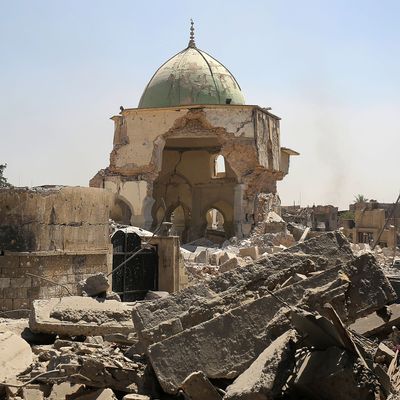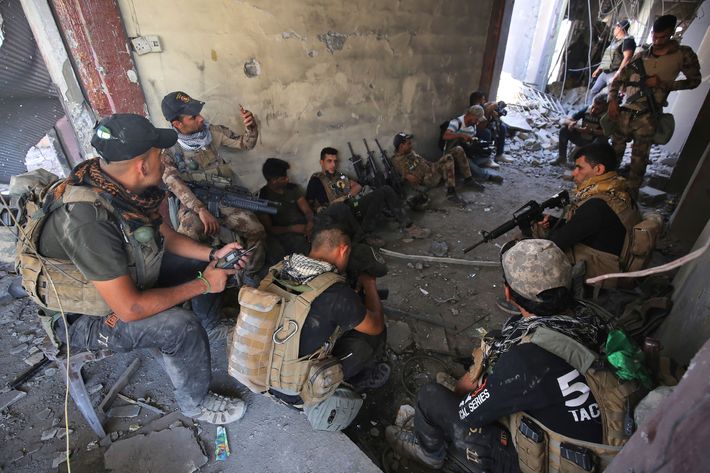
In the culmination of a siege that began last October, Iraqi government forces supported by a U.S.-led international coalition finally wrestled back the center of Mosul from the militant group Islamic State (ISIS) on Thursday, capturing the ruined Grand al-Nuri Mosque from which ISIS leader Abu Bakr al-Baghdadi proclaimed the restoration of the caliphate three years ago, Reuters reports.
Driving home the significance of this symbolic victory, Iraqi prime minister Haider al-Abadi declared ISIS’s so-called caliphate extinct, saying the capture of al-Nuri Mosque “marks the end of the Daesh state of falsehood,” using the Arabic acronym for ISIS. The group remains in control of a swath of territory the size of Belgium in Iraq and Syria, and hundreds of thousands of Iraqis remain under its draconian rule. However, ISIS has lost most of its territory in the past two years (this graphic from the BBC illustrates the progress Iraqi and Syrian forces have made in rolling back the jihadists’ conquests since January 2016) as well as its revenues from taxation, extortion, and black-market oil sales.
At the same time, in a separate campaign launched on June 6, Syrian militias backed by the U.S. have nearly completed the encirclement of Raqqa, ISIS’s Syrian capital. Although the battle to liberate Raqqa is just getting started, the coalition’s commander, Lieutenant General Stephen Townsend, told CBS News that coalition forces were “in the first 25 or 30 percent of the campaign” earlier in the week — besieging the 2,500 ISIS militants holed up in the city leaves them no choice but to surrender or fight to the death. Leaders of the group have reportedly been slipping out of the city, abandoning their soldiers to the siege.

The loss of their Iraqi capital and the impending loss of their Syrian capital are major defeats for ISIS, both materially and symbolically, and raise hopes that ISIS will disappear from the map as a territorial pseudo-state within the year. Yet while this may be the beginning of the end for Baghdadi’s dream of reconstructing the caliphate, it is far too early to cheer ISIS’s demise.
The loss of its Iraqi and Syrian territories may be a huge setback for ISIS’s leadership and core members, but the group has expanded well beyond its base in the Islamic heartland, taking advantage of the proliferation of failed states and effectively ungoverned territory in the greater Muslim world. ISIS’s Libyan branch has been regrouping after losing ground there, the New York Times reported back in March, taking advantage of that country’s present state of anarchy and copious supply of guns and unemployed young men. In Afghanistan, it has won the allegiance of groups formerly loyal to the Taliban and is establishing itself in a remote, ungovernable area of the north, according to the Times. Opportunities abound to reestablish the caliphate somewhere else.
On top of the limitless supply of hiding spots and power vacuums for ISIS to occupy, precisely what makes this group unlike any previous threat is that it is an amorphous, asynchronous, decentralized, transnational movement that can survive indefinitely, in some form or another, anywhere you can find angry young Muslim men with internet access. Even if ISIS’s affiliates in Afghanistan, Libya, Somalia, Egypt, Yemen, Algeria, Uzbekistan, the Philippines, and the Caucasus are all wiped out on the ground, it won’t take much work to get the band back together. Defeating its violent, nihilistic philosophy of Islamic chauvinist millenarianism will remain a much taller order.
And to that point, war-torn and traumatized places just like Mosul and Raqqa are exactly the kinds of milieus where militant groups like ISIS are born and bred. Though the cities are on the verge of liberation, the damage ISIS has done to these communities — death, destruction, torture, displacement, brainwashing, and so on — could take a generation to repair. If the people freed from ISIS’s grasp don’t get some support for their shattered communities, economies, and collective mental health (and given the state of things in Syria and Iraq today, they probably won’t), it’s not hard to imagine jihadist militancy making inroads there yet again.
Syria, in particular, remains extremely volatile. Even if ISIS is conclusively defeated there, which is by no means assured, the country’s six-year civil war will remain a multilateral stalemate with no end in sight. As Secretary of Defense James Mattis acknowledged on Monday, the complexity of the battlefield in northern Syria will only escalate if and when ISIS is driven out of Raqqa, as U.S.-backed Arab and Kurdish militias, Iranian-backed Shiite militias, Syrian government forces, and other Islamist insurgents squabble for territorial gains. If President Donald Trump’s makes good on his ostensibly non-Pentagon-cleared threats to retaliate if and when the Assad regime uses chemical weapons again, the complexity and danger could be compounded. Perhaps that’s why Congress is having second thoughts about letting this president retain unchecked power to wage war there under the 2001 authorization for use of military force.





























